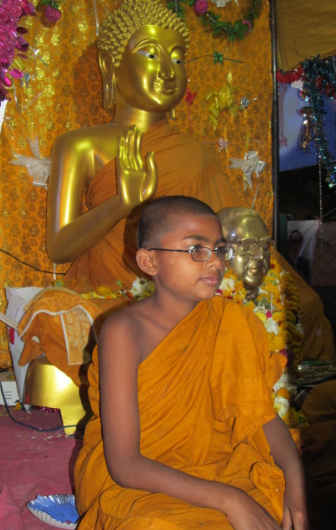Bhante on:
[Wikipedia]
[Google]
[Amazon]
 Bhante (
Bhante (
Buddhist Precept & Practice
Gombrich, Richard F. Clarendon Press: 1995 , Page 141
 Bhante (
Bhante (Pali
Pāli (, IAST: pāl̤i) is a Classical languages of India, classical Middle Indo-Aryan languages, Middle Indo-Aryan language of the Indian subcontinent. It is widely studied because it is the language of the Buddhist ''Pali Canon, Pāli Can ...
; , ; ), sometimes also Bhadanta, is a respectful title used to address Buddhist
Buddhism, also known as Buddhadharma and Dharmavinaya, is an Indian religion and List of philosophies, philosophical tradition based on Pre-sectarian Buddhism, teachings attributed to the Buddha, a wandering teacher who lived in the 6th or ...
monks, nuns
A nun is a woman who vows to dedicate her life to religious service and contemplation, typically living under vows of Evangelical counsels, poverty, chastity, and obedience in the Enclosed religious orders, enclosure of a monastery or convent.' ...
, and superiors, especially in the Theravada
''Theravāda'' (; 'School of the Elders'; ) is Buddhism's oldest existing school. The school's adherents, termed ''Theravādins'' (anglicized from Pali ''theravādī''), have preserved their version of the Buddha's teaching or ''Dharma (Buddhi ...
tradition. In English, the term is often translated as ''Venerable''.
Etymology
''Bhante'' is a gender-neutral term, and may be used to address both monks andnuns
A nun is a woman who vows to dedicate her life to religious service and contemplation, typically living under vows of Evangelical counsels, poverty, chastity, and obedience in the Enclosed religious orders, enclosure of a monastery or convent.' ...
. It is the vocative
In grammar, the vocative case (abbreviated ) is a grammatical case which is used for a noun that identifies a person (animal, object, etc.) being addressed or occasionally for the noun modifiers (determiners, adjectives, participles, and numeral ...
form of the word ''bhadanta'', which confers recognition of greatness and respect.
The Nepali terms ''bare'' and ''bande'' have the same derivation and are used to address Buddhist clergy. Bhante can also be used as an honorific or a form of address to specific Buddhist monks, similar to Ajahn, Phra or Luang Por in Thailand or Ashin in Burma (now Myanmar
Myanmar, officially the Republic of the Union of Myanmar; and also referred to as Burma (the official English name until 1989), is a country in northwest Southeast Asia. It is the largest country by area in Mainland Southeast Asia and has ...
), Rinpoche
Rinpoche, also spelled Rimpoche (), is an honorific term used in the Tibetan language. It literally means "precious one", and may refer to a person, place, or thing—like the words "gem" or "jewel" (Sanskrit: '' Ratna'').
The word consists of '' ...
in Tibet.
Some famous monks who are addressed with ''bhante'' include:
* Bhante K. Sri Dhammananda
* Bhante Dharmawara
* Bhante Henepola Gunaratana ("Bhante G.")
* Bhante Dhammalok Mahasthavir
* Bhante Kumar Kashyap Mahasthavir
* Bhante Pragyananda Mahasthavir
* Bhante Sitagu Sayadaw
* Bhante Vimalaramsi
Grammatically "bhante" is a vocative case
In grammar, the vocative case (abbreviated ) is a grammatical case which is used for a noun that identifies a person (animal, object, etc.) being addressed or occasionally for the noun modifiers (determiners, adjectives, participles, and numeral ...
form of a Pali word "bhadanta" (venerable, reverend). The vocative case denotes and is used for address.Gombrich, Richard F. Clarendon Press: 1995 , Page 141
In literature
The title ''bhante'' is used among monks to address superiors within thesangha
Sangha or saṃgha () is a term meaning "association", "assembly", "company" or "community". In a political context, it was historically used to denote a governing assembly in a republic or a kingdom, and for a long time, it has been used b ...
. The Pali Canon
The Pāḷi Canon is the standard collection of scriptures in the Theravada Buddhism, Buddhist tradition, as preserved in the Pāli language. It is the most complete extant Early Buddhist texts, early Buddhist canon. It derives mainly from t ...
abounds with references to the Buddha
Siddhartha Gautama, most commonly referred to as the Buddha (),*
*
*
was a wandering ascetic and religious teacher who lived in South Asia during the 6th or 5th century BCE and founded Buddhism. According to Buddhist legends, he was ...
's disciples addressing their seniors in this way. While the Buddha is usually addressed with the term '' Bhagavān'', his disciples also sometimes addressed him as ''Bhante''.
See also
* Ayya * Ajahn * Anjali * Awgatha * Phra * SayadawReferences